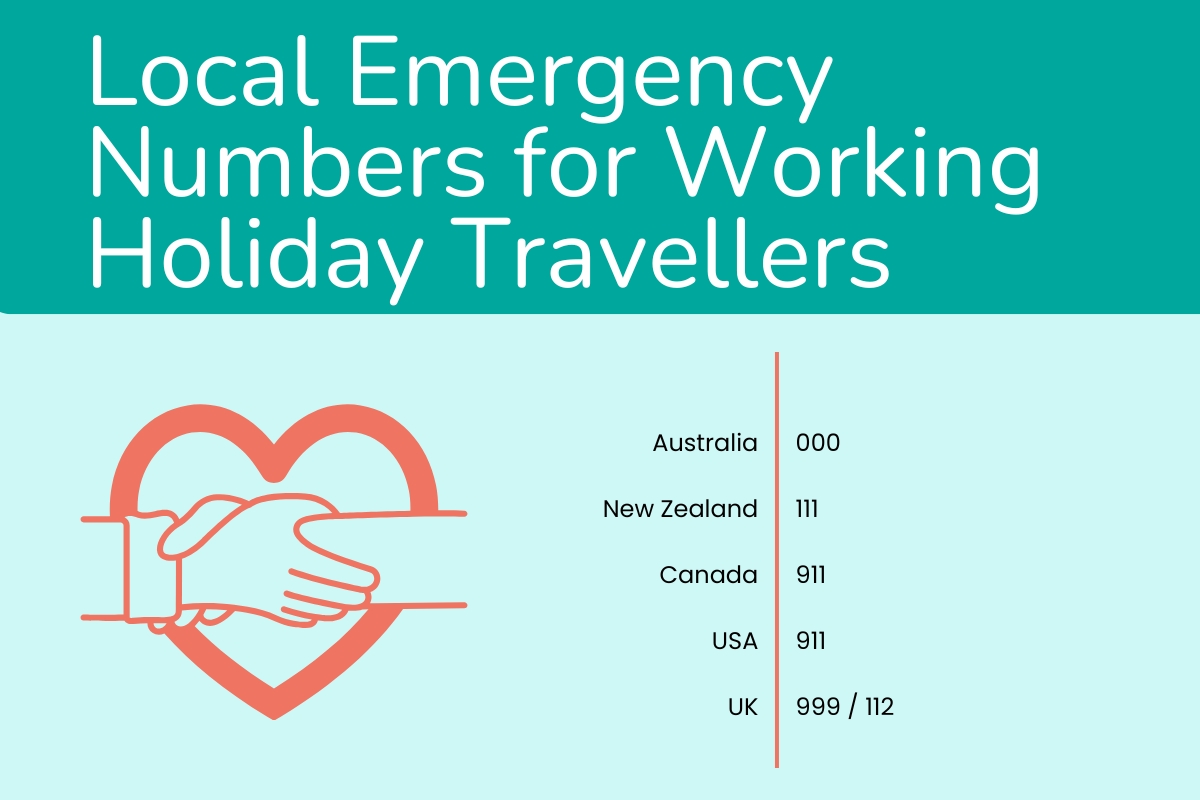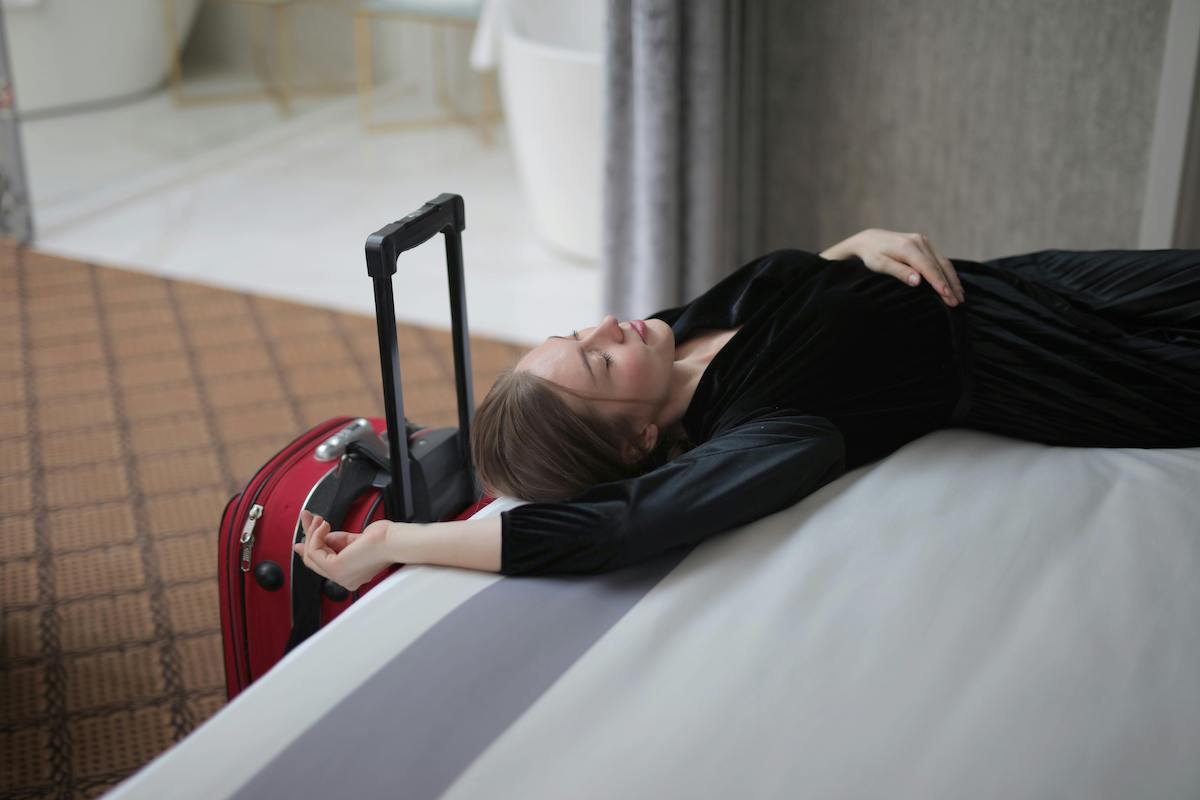News
How to Stay Healthy on a Working Holiday
27 May 2025

A working holiday can be the adventure of a lifetime! Whether you’re teaching watersports at Camp America, fruit-picking under the Aussie sun, or snowboarding between shifts in Canada, a working holiday is life-changing. With a working holiday visa in your pocket and a one-way ticket in hand, the world really does open up. But amidst the excitement of new jobs, travel buddies, and weekend road trips, it’s easy to forget one crucial thing: your health.
Staying healthy while on a working holiday isn’t just about avoiding illness. It’s about having the energy, resilience, and peace of mind to truly enjoy your experience abroad. From jet lag and hostel bugs to long shifts and unfamiliar healthcare systems, being prepared can make all the difference.
In this guide, we’ll share 10 essential tips for staying healthy on a working holiday, covering everything from eating well on a budget to protecting your mental wellbeing. Whether you’re heading to Australia, Canada, New Zealand, or the USA, these practical suggestions will help you thrive during your time overseas.
Oh – and don’t forget your most important travel companion: working holiday travel insurance! More on that later.
1. Get Prepared Before You Go

One of the best ways to stay healthy while on a working holiday is to lay the groundwork before you even leave home. A little planning goes a long way when it comes to avoiding health issues abroad. It can also save you time, stress, and money.
Schedule a visit to your GP and dentist before departure. This is a great chance to catch up on any vaccinations, refill prescriptions, and make sure you’re in good shape before heading overseas. Dental work, in particular, can be expensive or hard to access once you’re abroad.
Get a full medical and dental check-up before departure.
If you take regular medication, speak to your doctor about getting enough to cover your trip (or at least the first few months). Keep meds in their original packaging and bring a copy of your prescription in case you need to restock overseas. Be sure to research whether your medication is legal and available in your working holiday destination.
Research Your Destinations’ Healthcare System
Healthcare access varies widely depending on where you’re headed. In countries like the USA and Canada, visitors may need to pay out-of-pocket for medical treatment unless they have comprehensive insurance. In comparison, countries like Australia have Medicare in place.
If you’re wondering how to access healthcare during a working holiday, travel insurance can bridge that gap.
It’s important to have the right working holiday travel insurance. Accidents can happen on the job, and unexpected illnesses can quickly derail your plans. Make sure your policy includes cover for working abroad, emergency medical care, and any activities you plan to take part in – whether that’s hiking, hospitality work, or volunteering.

2. Prioritise Sleep – Your Secret Travel Superpower
Between long-haul flights, new time zones, and late-night hostel chats, getting quality sleep on a working holiday can be tricky – but it’s crucial if you want to stay healthy, alert, and ready to enjoy the adventure.
Working holiday accommodation isn’t always sleep-friendly, especially if you’re sharing a dorm or crashing in a busy staff house. Pack earplugs, an eye mask, and maybe even a small lavender spray to help create a calming bedtime routine. Noise-cancelling headphones or a white noise app can also work wonders.
How To Beat Jet Lag

If you’re flying halfway around the world for your working holiday, like from the UK to Australia or Canada, jet lag is inevitable. Try these simple life hacks to beat jet lag on your next long-haul flight:
- Adjust your sleep schedule a few days before you fly
- Stay hydrated during your flight
- Get some daylight exposure when you land.
These simple habits can help reset your body clock faster. Once you find a new routine, stick with it as best as you can!
Whether you’re working at a summer camp in the US, doing shifts in a bar in Sydney, or harvesting apples in British Columbia, having a rough daily rhythm can help regulate your sleep. Aim to wind down before bed and avoid too much caffeine or screen time late at night.
Getting enough rest is one of the most underrated tips for staying healthy while working abroad. It supports your immune system, keeps your mood stable, and helps you perform your best on the job, whatever that may be.
3. Eat Well on a Budget

When you’re living on a backpacker budget or working for minimum wage, it’s tempting to survive on instant noodles and hostel toast. But what you eat has a huge impact on your energy, immunity, and overall wellbeing, especially when you’re adapting to new routines and environments.
Eating out every day can add up quickly, especially in countries like Australia or Canada, where prices can be higher than those back home. Most hostels, camps, or shared accommodations will have a basic kitchen. Use it! Stock up on simple, affordable staples like oats, rice, lentils, tinned beans, frozen veggies, and eggs.
And of course, we will say the obvious – STAY HYDRATED.
Hydration is especially important in hotter climates like Australia or New Zealand, where dehydration can creep up on you. Carry a reusable water bottle and refill regularly. If tap water is safe where you are (which it is in many working holiday destinations), it’s a free and healthy way to stay sharp.
Meal Prep Is A Winner
If you’re working long shifts, like at a ski resort in Canada or Camp America, prepping lunches and snacks can help you avoid unhealthy impulse buys. Think pasta salads, wraps, overnight oats, or homemade trail mix.
4. Stay Active (Even If You’re Working Hard)

You may be on your feet all day. Perhaps you’re wrangling kids at Camp America, cleaning chalets in the Rockies, or picking grapes in the Aussie heat. The last thing you might feel like doing is more movement. However, regular exercise, outside of work duties, is a powerful tool for boosting your mood, energy, and resilience.
You don’t need a gym membership to stay fit while travelling. You could go for morning beach runs, find a local yoga class, or explore nearby hiking trails in your spare time.
| Destination | Activity |
| Australia | Try coastal walks like the Bondi to Coogee trail in Sydney, go for an early-morning swim at the beach, or rent a surfboard in Byron Bay. Most cities have free outdoor gyms in local parks. |
| Canada | Take advantage of incredible hiking in national parks like Banff or Jasper, go kayaking on the lakes, or rent snowshoes in the winter. If you’re based in Whistler or a ski resort, snowboarding or skiing is built into your day! |
| USA (Camp America) | Camps often include structured activity time, so join in! Paddleboarding, basketball, trail running, and even dance sessions are usually part of the experience. |
| New Zealand | Take weekend trips to do popular walks like the Tongariro Alpine Crossing, or join a local rugby or frisbee team for some social sport. |
All of these you can do with friends as well! After all, working holidays are all about meeting new people.
Stretch and Recover
Physical jobs can take a toll on your body, especially if you’re lifting, bending, or standing for hours. Make time for some gentle stretching or yoga to release tension and prevent injury. Even five minutes before bed can make a big difference.
5. Look After Your Mental Health

A working holiday is packed with exciting moments, but it’s also a big change. Being away from home, adapting to a new job, and living in unfamiliar surroundings can all take a toll on your mental health. That’s totally normal, and there are simple ways to look after your mind while you’re abroad.
You might be living your dream, but that doesn’t mean every day will feel amazing. Culture shock, homesickness, and burnout are all common experiences for working holidaymakers. The key is recognising how you’re feeling and giving yourself space to process it.
Stay Connected and Find A Community
Feeling isolated is one of the biggest mental health challenges while travelling.
Thanks to technology, staying in touch with friends and family back home has never been easier. Schedule regular catch-ups, send voice notes, or share updates via WhatsApp or social media. Just hearing a familiar voice can do wonders for your mood when you’re feeling far away.
Make an effort to connect with people around you. Joining hostel activities, sports teams, or Facebook groups for expats and working holidaymakers can help you find your people.
If you’re really struggling with your mental health while travelling, reach out for help. Many countries have free or low-cost counselling services available, or you can speak to a GP for support.
Looking after your mental wellbeing while on a working holiday is just as important as eating well or getting enough sleep. When you feel balanced and supported, you’re far more likely to enjoy the incredible experience you set out for.
6. Stay Safe on the Job

Whether you’re flipping burgers in a beach café, helping out at a summer camp, or working on a farm in rural Australia, workplace safety matters.
Every country has its own rules when it comes to visas, working conditions, and employee rights. Before you start a job, do a little research to understand what’s fair and legal, especially in seasonal or casual roles where exploitation can unfortunately happen. If something feels off, speak up or seek advice from a local employment or backpacker support service.
Don’t be afraid to ask for training and support. You should never be expected to jump into a new role without proper guidance. Whether you’re operating machinery, working with children, or handling food, make sure you’ve had the right training. If something seems unsafe, raise it – your health and safety should always come first.
Make Sure You’re Covered
If you’re injured at work, access to care and compensation may vary depending on where you are. Having proper working holiday travel insurance can help cover medical treatment, transport, or even returning home if something serious happens. Look for a policy that includes working abroad and high-risk activities, just in case.
Staying safe on a working holiday is all about being informed, prepared, and looking after yourself, just like you would at home. The right attitude (and the right insurance!) means you can focus on the fun stuff, knowing you’ve got your back covered.
7. Be Sun Smart and Weather Ready

Never underestimate the sun. In places like Australia and New Zealand, the UV index can be extreme even when it’s cloudy. Sunburn isn’t just uncomfortable; it also increases your risk of heatstroke, dehydration, and long-term skin damage.
Basic sun safety tips:
- Apply high-factor sunscreen (SPF 30+)
- Wear a wide-brimmed hat
- Cover up with lightweight, long-sleeved clothing if you’re working outdoors
If your job involves being active in the heat, like fruit picking, tour guiding, or construction, staying cool is essential. Drink water regularly (set reminders if needed), take breaks in the shade, and watch for signs of heat exhaustion like dizziness, headache, or nausea. Electrolyte tablets or rehydration drinks can help replace lost salts on really hot days.
Prepare For The Season
Heading to Canada or the Northern US for a winter season? Cold conditions bring their own challenges. Wear moisture-wicking base layers, a good-quality insulated jacket, and proper footwear to keep warm and dry. Frostbite and hypothermia are real risks, especially if you’re working outdoors or spending a lot of time in snowy areas.
Even tropical or warm destinations can have sudden weather changes. Storms, bushfires, or extreme heatwaves are not uncommon in places like Australia, so stay informed and follow local guidance when needed. Pack for variety, and don’t rely on the weather being predictable.
8. Avoid Common Travel Bugs

Nothing throws off your working holiday plans quite like getting sick. Whether it’s a dodgy stomach, a cold from a bunkmate, or a mosquito-borne illness, it pays to be proactive when it comes to your health. Staying fit and productive means dodging the common culprits that can strike when you’re on the move.
Basic hygiene goes a long way – especially in shared spaces like hostels, camps, and staff accommodation. It goes without saying, wash your hands regularly!
If you’re working in regions where tap water isn’t drinkable, always use filtered or bottled water for drinking and brushing your teeth. Be cautious with street food, especially if it’s been sitting out or looks undercooked.
Learn to trust your instincts. If it looks risky, give it a miss.
Don’t Ignore Small Symptoms
Minor issues like insect bites, stomach upsets, or skin infections can escalate quickly if left untreated. If you’re not feeling right, don’t brush it off. Many working holidaymakers have access to local clinics or walk-in centres, and having travel insurance means you won’t need to worry about the cost of seeing a doctor abroad.
| Destination | Common Illnesses / Risks | Tips to Stay Healthy |
| Australia | Heatstroke, dehydration, mosquito-borne viruses (e.g. Ross River Fever) | – Stay hydrated – Use high-DEET insect repellent – Wear long sleeves at dusk/dawn |
| Canada | Cold/flu in winter, tick-borne illnesses (e.g. Lyme disease) | – Dress in layers, especially in ski resorts – Check for ticks after hikes – Get a flu jab |
| USA (Camp America) | Stomach bugs, head lice, heat rash (in hot states) | – Practice good hygiene – Don’t share towels or hats – Shower daily in hot/humid weather |
| New Zealand | Sunburn, Giardia (in some freshwater), sandfly bites | – Always wear SPF 30+ – Drink treated or boiled water when hiking – Use insect repellent in remote areas |
9. Take Breaks and Set Boundaries

Working holidays are a whirlwind of new experiences, long hours, and socialising, which can make it hard to find time to rest. But taking regular breaks and setting clear boundaries is essential to avoid burnout and keep your energy levels high throughout your trip.
Your body will tell you when it needs a break. Don’t push through exhaustion; rest is part of staying productive and healthy.
Of course, it’s easy to get caught up in the excitement of new friends and extra shifts, but overcommitting can quickly lead to stress. Setting boundaries around work hours and social plans helps you maintain balance and avoid feeling overwhelmed.
10. Get Travel Insurance (Your Best Health Backup)

No matter how prepared and careful you are, unexpected health issues or accidents can happen while you’re on a working holiday. That’s why having the right working holiday travel insurance is essential. Think of it as your safety net if things don’t go to plan.
From medical emergencies and hospital visits to lost luggage or travel delays, travel insurance protects you financially and gives peace of mind. If you fall ill, get injured, or need to cut your trip short, a good policy helps cover the costs so you don’t face huge bills abroad.
What to Look for in a Policy
- Medical coverage: Includes doctor visits, hospital stays, and emergency evacuation.
- Coverage for your job: Some policies include protection if you’re working in agriculture, hospitality, or childcare.
- Mental health support: Access to counselling or telehealth services can be invaluable.
- Trip cancellation and delays: For unforeseen events that disrupt your plans.
Why Choose Go Walkabout?
As specialists in travel insurance for working holidaymakers, we understand the unique needs of travellers on visas like Camp America, Working Holiday Visa Australia, and Canada Working Holiday. Our policies are tailored to cover the kinds of jobs and adventures you’ll encounter.
Don’t let unexpected health issues derail your working holiday dreams. Protect yourself with comprehensive travel insurance from Go Walkabout — your trusted partner for safe, healthy, and worry-free travel.
Get a quote today or learn more about our working holiday insurance now.
Related posts
We’re all going on a working holiday!
12 July 2012Read more
Places to Visit | Travel NewsLondon is the most highly-rated city destination
30 July 2012Read more
Misc | Special EventsA Travel Insurance Policy for Father Christmas
3 December 2012Read more
CompetitionsHidden Gems Travel Competition Entries
7 March 2013Read more